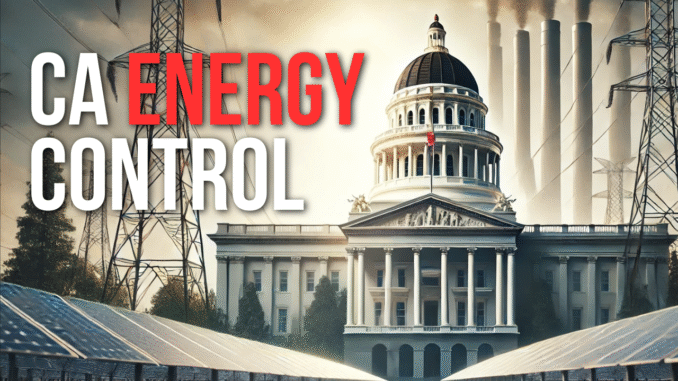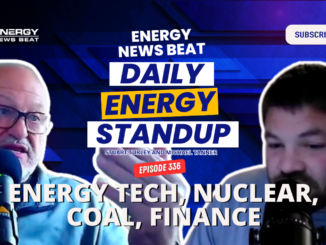
Daily Standup Top Stories
Stargate Advances with 4.5 GW Partnership with Oracle
In a landmark move that underscores the escalating energy demands of artificial intelligence, OpenAI has announced a partnership with Oracle to develop an additional 4.5 gigawatts (GW) of data center capacity for its Stargate AI […]
California Oversteps Its Borders: Forcing Energy Policies on the Rest of the United States
In the grand theater of American federalism, states are meant to serve as laboratories of democracy, experimenting with policies that suit their unique needs without imposing them on the nation at large. Yet, California, with […]
Poland Announces the Largest-Ever Oil Discovery on Polish Territory
In a groundbreaking development for Europe’s energy landscape, Poland has unveiled what officials are calling the largest oil discovery in the nation’s history. The find, located in the Baltic Sea off the coast near the […]
If Alberta Referendum to Become the 51st State Gains Traction, What Would the Financial Reality Look Like?
In the heart of Canada’s oil country, a provocative idea is simmering: What if Alberta, the powerhouse of North American energy production, held a referendum to secede from Canada and join the United States as […]
Europe’s Chemical and Downstream Industry Seeks a Lifeboat to Stay in Business
In the heart of Europe’s industrial landscape, the chemical and downstream sectors—key players in producing everything from plastics to fertilizers—are sounding the alarm. Facing skyrocketing energy costs, outdated infrastructure, and fierce global competition, industry leaders […]
Highlights of the Podcast
00:00 – Intro
00:14 – Stargate Advances with 4.5 GW Partnership with Oracle
03:40 – California Oversteps Its Borders: Forcing Energy Policies on the Rest of the United States
08:17 – Poland Announces the Largest-Ever Oil Discovery on Polish Territory
09:29 – If Alberta Referendum to Become the 51st State Gains Traction, What Would the Financial Reality Look Like?
13:10 – Europe’s Chemical and Downstream Industry Seeks a Lifeboat to Stay in Business
17:08 – Markets Update
19:21 – Outro
Follow Michael On LinkedIn and Twitter
Need Power For Your Data Center, Hospital, or Business?
– Get in Contact With The Show –
Video Transcription edited for grammar. We disavow any errors unless they make us look better or smarter.
Michael Tanner: [00:00:00] California forcing its bad energy policies on the rest of the United States, next on the Energy Newsbeat Daily Standup. [00:00:06][6.4]
Stuart Turley: [00:00:14] Stargate advances with 4.5 gigawatt partnership with Oracle. This is an important story, especially for Abilene, Texas. And in our article that we have here, you can see Stargate’s picture right there. I have driven by that location several times. It is amazing. This collaboration revealed in July 2025 pushes the total Stargate capacity under development to over five gigawatts capable of supporting more than Two million AI chips, Michael, that is a lot for me. That’s a bunch. Can you imagine how many news stories we could run on two million AI chips, but open AI Stargate initiative represents a bold vision for AI infrastructure and how they’re getting there, Michael is a step. In process. They’re going to invest 50 billion and 10 gigawatts of AI data centers around the US over the next four years. But in Abilene, Texas, they’re starting out with used jet engines as natural gas turbines to get them started. And then they’re going to leave those in place. And they’re then going to go through and step this in and use those for backup power. AI alone could add 35 to 108 gigawatt load capacity by 2030. Michael, the stories we’ve been running in the last two weeks, the numbers don’t. Add up. There’s only 22 gigawatts of nuclear and natural gas ready for the grid. What does that mean? I went and got my crayon calculator here from Oklahoma State. It’s an actually, it comes in a cracker jack box. And so you get this decoder ring for gigawatt capacity and they were like, we’re short a lot. This is unbelievable. [00:02:08][113.6]
Michael Tanner: [00:02:09] No, it really is unbelievable. And I think you hit the nail on the head with this article and your analysis of the math. Isn’t math, you know, from the standpoint of you have all of this new generation that’s going to be needed in terms of not just what’s going on with Stargate, but what’s going on With AI development all around the country. And now you look at what we’re taking offline, we’re retiring natural gas plants in California, we can’t get nuclear any facilities from a nuclear standpoint actually developed. So we’re going to end up in this situation, we’re basically going in opposite directions from what we need from a generation standpoint to what we actually have available and it’s going to drive us to coal. I mean I think we me and you can both agree that you know Trump when he talks about clean coal he’s just being funny. I mean coal itself is not the cleanest form of energy. One of the reasons why the world’s carbon emissions have gone down over the last 300 years is because we moved from a physical, we moved to burning wood, to using coal, to now using natural gas. Natural gas is the cleanest form of energy, we have an abundant source of it, and so what’s going to happen is we’re going to drive this country back to coal, which doesn’t make anybody better off. [00:03:15][65.9]
Stuart Turley: [00:03:15] No, and clean coal is a decent term. I think what you’re gonna see, and that brings up several new articles that I’m working on, and that is the definition of pollution. We need to define what pollution is. It’s not what is is, it’s what is pollution. And CO2 is not pollution. It’s the particulate matters in the coal exhaust that is bad, not the CO2. Let’s go to the next story, Michael. Michael, you can’t beat a good old Governor Newsom hair gel story. California oversteps its borders, forcing energy policies on the rest of the United States. I absolutely would love not to interview Gavin Newsom. Unpacking the Senate Bill 253, the Climate Corporate Data Accountability Act SB 253 stands as the nation’s first mandatory climate emissions disclosure rule, compelling large businesses to report their greenhouse Gasses emission under the three scopes. Scopes one, direct greenhouse gas emissions from owned or controlled. Scope two, indirect from purchased energy such as electricity or heating. Scope three, all other emissions in the value chain. How in blankety blank blankety, blank, are you gonna be able to do any of that? And all this is is a horrible burden on people trying to gain information from your supply chains all the way through your supply chain that they don’t have the technical capabilities of doing. And then the penalties. Holy smokes, Batman. This is a revenue for, you know, it’s one thing to have billions of dollars for a light rail speed system that you cannot even get one track laid for and you’re looking for a way to I think we found the way that they’re trying to fund their light rail system. [00:05:14][119.3]
Michael Tanner: [00:05:15] Well, I also think the hard part with all of this, Stu, is in good faith, I can say, sure, maybe we have, maybe you should be reporting your scope one emissions. I can, you’re, you know, I’m not going to die on the scope one emissions hill, the scope two emissions. It’s hard. It’s I might die on that hill. I promise you the hill. I’ll die on a scope three emissions because the definition of scope three emissions is basically anything that’s associated with you. I mean, you, you the old phrase, seven steps away from Kevin Bacon. Well, everybody is seven steps away from some sort of extremely harmful thing. I mean, if you took a hot shower this morning or any type of shower this morning, you’ve participated in scope three emissions. If you jumped in a car today, the fact that you’re listening to this show via YouTube or podcast means you’re participating in scope three emissions, so now what are we going to do? I mean I think this gets really wonky for companies that even aren’t in the energy business who now have to start caring. I mean should open AI have to reporting its scope one scope two scope three emissions no this is and again this is specifically for attempting to do this for energy companies. I know what they’ve said is that it’s, you know, annual revenues exceeding $1 billion. Well, guess what that does? That eliminates a lot of companies that fall under that threshold. You don’t think they pick that $1-billion mark strategically? Yeah, because they want to filter out and only want to go and target oil and gas companies. I hate Scope 3 emissions or this idea that we need to care about Scope three emissions. It’s hard for an individual company to care about that, you now, and they’ve tried to say, Well, guess what? The scope, you know, there’s a penalty for non-compliance, which is about 500,000 per year. I mean, not that much. If you’re a billion dollar revenue a year company, you should be able to afford 500 grand. Scope 3 emission errors though that are made in good faith are somewhat forgivable by 2030. But you also mentioned this in your article, Stu, beyond the fines, the real burden lies in the operational costs, building cross-functional teams across finance, legal and operations, third-party verifiers navigating and that can navigate that collection for scope 3. And the real question is the accuracy is a major hurdle. This is a very interesting quote. You say scope 3 data is notoriously imprecise prone to double counting or gaps leading to potential misstatements that could invite lawsuits and reputational damage. As one analyst notes, these requirements create, quote, convoluted filing requirements that amount to little more than make work. I love that quote. [00:07:32][137.1]
Stuart Turley: [00:07:32] It is absolutely despicable. And when you sit back and take a look at Senate bill 253 and Senate bill 261, they exemplify state level overreach. Imposing burden them error prone reporting. And I mean, this is absolutely despicable, Michael, how this ties into the UK, Canada and the EU is critical because they are looking to Gavin Newsom to tie the United States to their standards. And that’s the back door that they’re looking for. So this is actually a global push by the global elites trying to force the United States into this blue hockey. [00:08:14][41.8]
Michael Tanner: [00:08:15] Yeah, pretty, pretty unbelievable. All right, let’s move to the next one. [00:08:17][2.6]
Stuart Turley: [00:08:18] I like this story. Way to go Poland. Poland announced the largest ever oil discovery in Polish territory. Energy security starts at home and I am happy for these guys. The discovery was made by the Central European Petroleum, CEP, a key player in the regional exploration in the Woolloom East BE1 well. And they look at tons of oil rather than barrels. So 22 million tons of oil is actually 161.26 million barrels. I had to get my crayon out to figure that out. And 5 billion cubic meters BCM of gas. That’s a lot, dude. Just in that one well. They need this. [00:08:58][40.6]
Michael Tanner: [00:08:59] No, they really they really do need this. I mean, Poland is one of those countries that has very little domestic energy production. If there’s anything that we’ve pounded on this show, it’s that domestic energy production for any country is all is directly tied with energy security. This is going to be great for them and we’re happy for them. It is offshore, so it’s going to make a little bit more challenging to get, but really, really great for them. [00:09:22][23.2]
Stuart Turley: [00:09:22] Oh yeah. And, uh, but the Ukrainian seals are very talented in that part of the world. That’s a joke for people in the show. If this is the next story, if Alberta referendum become the 51st state gains traction, what would financial reality look like? Michael, I had a blast writing this one in the heart of Canada’s oil country, a new idea is simmering. What if Alberta, the powerhouse of North American energy production held referendum to secede from Canada and join the United States is a 51st state. We’d all go, yeah! I think it would be fabulous. I know a couple of great Canadians up there that I’d go see in a heartbeat. While this remains hypothetical, it’s gaining traction. They are hacked. They are tired of it. Let’s go through some of these numbers, Michael. They have been giving, listen to this, crude oil production is 43 million barrels per day of crude oil production. Oil sands is 3.4 million barrels. And when you take a look at natural gas has an average of 10.9 billion cubic feet per day. Advantages for Alberta is that they would gain military protection. Disadvantage for Canada is that, they would lose a gigantic Revenue stream that gigantic revenue stream is phenomenal however it would unleash the oil sands coming to the united states and i think that they would make more money because there would no longer be a price differential that we would be able to beat him down. [00:11:02][99.9]
Michael Tanner: [00:11:02] I agree. I mean, I think in theory, this would be awesome. We’d, I’d love nothing more than welcome Alberta as part of the United States. Do I think it’s actually going to happen? No, I don’t think it’ll happen much like I don’t think Texas will end up seceding from the union as every three years that pops up around here. So I think the politics are a lot more complicated than just this idea that, oh, it’ll be an easy fit. I mean if you’re Canada, you’re not going to let this go. Would the United States even welcome Alberta? I mean, I think me and you would welcome them tremendously. The question is, would Congress, I mean we know Trump would, but this isn’t just something that, you know, a person can do unilaterally. So the question is would Congress vote on this? How would this actually look? I think the unknowns right now outweigh the knowns. And if, you know from an asset management standpoint, whenever you get a trade like that. I pass on it, because if what I know is less than what I don’t know, well, what I don’t know then can harm me way more than what I know. So I think, I think you’re, you’re you’re absolutely spot on from, we would love to have the revenue. We would love to have the oil and gas production. You’re spot on when you talk about the differentials are great, but I think in reality, this is much tougher than it sounds. And I don’t t know from a politics standpoint, whether or not it would be worth it. I mean, I, I think the military protection is, is the least of our concerns. I know they can it on their own You know, Canada, I don’t think is going to march in on horseback anytime soon and try to take it back if they decide to do that. I mean that with all due respect to the, to the Royal Mount police, I just, I don’t, think from a military perspective, I’d be all that concerned. I’m more concerned about what’s the fallout between these two countries. We do know, as you point out here in your bottom line. That Canada is pushing closer to EU and the UK, continuing to adopt these net zero policies. So if the only reason Alberta’s looking to move is because of energy, I mean, obviously we would take it. I go ahead and think back to the concept of, would the politics work? I’m not sure if it would. [00:12:53][110.2]
Stuart Turley: [00:12:53] No, the odds are low. But on the other hand, they now have the referendum and is now becoming a legal issue. So it is now no longer a conspiracy theory. The referendum has got enough signatures. So it’s now going to go to the voter of the people that turns it to a whole new set. Let’s go to next one. Europe’s chemical and downstream industry seeks a lifeboat to stay in business and heading to the United States thanks to Gavin Newsom’s energy policies like we covered. This is a follow along story, the weight of net zero regulations on Europeans. Chemical sector is abysmal. The sector responsible for about 5% of global CO2 emissions must navigate a web of policies aimed at slashing greenhouse gasses while maintaining competitiveness. The fees and everything that we talked about, just absolutely here we are with Scope 3 emissions and they’re talking about all this. All of this crap is being forced in with California, the Scope 1, Scope 2, Scop 3. And if Chris Wright and his team don’t get proposed legislation into law, we are going to have to fight to have our oil companies not paying all this extra money to try to do business with the European Union. It is absolutely pathetic what they’re doing. [00:14:18][85.2]
Michael Tanner: [00:14:18] No, absolutely. I mean, I don’t need to pound the fist on Scope 3 emissions, but they’re absolutely, in my opinion, unbelievable. I think this part that you… Talk about later in the article, which was ripple effects on US manufacturers and oil companies. There is a trickle-down effect that does affect specifically the big international players who have to now comply with multiple different laws, both in the United States and in the EU. You know, it also is pretty crazy to think that our favorite organization, the IEA, they warned that net zero transitions demand a 50% drop in oil and gas emissions intensity by 2050, which does require about $600 billion of investments, which to be honest is probably light. In my opinion, you go on to talk about all the scope through emissions, which we don’t need to dive into. I think it’s unbelievable, but I mean, the, the world’s gone crazy. This goes along with that great substack article you wrote this morning and how large oil and gas companies are having to basically navigate and fleeing this net zero business. I mean it’s really unbelievable. [00:15:12][53.8]
Stuart Turley: [00:15:13] Oh yeah, and when you sit back and take a look, energy giants abandon global net zero group over oil and oil and gas clamp down. This is pretty funny when you got Shell, Norway’s Acre BP and Canada’s Enbridge are now exiting that group. Pretty crazy. [00:15:31][18.4]
Michael Tanner: [00:15:32] Yeah, it really is. So why guys, let’s jump over and cover some oil and gas finance before we do that. Let’s quickly pay the bills. As always, all the news and analysis is brought to you by EnergyNewsbeat.com. Hit the links in the description below for all timestamps, all links to the articles. You can also subscribe to us on Substack, a great, great place to one, support the show, but also stay up to speed and get daily, daily insights into your inbox every single morning. Stu does a great job of writing a bunch of content there. I’m going to be, I’m rolling about out a bunch of content that VR research apps will highly recommend subscribing there. Also like to shout out Reese Energy Consulting for supporting the show guys. We love Reese Energy consulting because we know they do good work. If you are at all attached to the midstream space, whether you’re an upstream company who needs help negotiating first purchaser contracts or putting together negotiations as you’re looking to tie into a pipeline and decisions to make around that Reese Energy, consulting has your back. If you’re in the mid stream space, they have a variety of services that can help. Augment your current team. Their clients range anywhere from two guys sitting in a garage all the way up to the largest publicly traded companies in the world. So if you’re wondering, are they a fit for you? The answer is yes. That’s reeseenergyconsulting.com. We love all of them over there. And finally, guys, check us out, investinoil.energynewsbeat.com to fill out our oil and gas portfolio survey. If you are interested in investing in oil and gas and don’t know where to begin, don’t what questions to ask, go ahead and fill out that We’re going to send you a bunch of information, and then we will, if. Depending on how you respond, we will point you in the right direction. InvestInOil.EnergyNewsBeat.com. [00:17:05][93.6]
Michael Tanner: [00:17:08] Stu, when we look at top line indices, S&P 500 pretty flat today. NASDAQ was down about a half a percentage point, two in 10 year yields down about a percent. Individually, Dollar Index drops another four tenths of a percentage point. Bitcoin up about 1.8 percentage points all the way above $119,000. Crude oil took another swing to the downside today on 1.3 percentage points all the way down to 6506, dancing around that number. Brent oil down about a little bit less, down about half a percentage point, down to 6833, natural gas down another 2.3 percentage points, down to $3. And 24 cents. Ironically, our EMP securities contract, XOP, was actually up 1.3 percentage points, which our oil field services was up 2.3% points. So a little interesting bifurcation there. Really, the main reason we saw prices fall today was this concern that any trade deal between the US and the EU might not happen. The renewed fears that it might not happen, we saw some stuff come out on Truth Social from President Trump that basically kind of stunted what people thought was some positive movement. Towards a potential deal. But if there is any new extra tariffs or the thought is that we will see some economic slowdown there. He’s basically threatened a 30% tariff on EU. If there’s the August 1 deadline is not hit, which is gonna be pretty interesting. We also saw that the interim trade deal that we have with India has also dimmed and that’s according to multiple Indian government sources. So it doesn’t look like there we love. We love our Indian brothers and it’s just going to be very interesting to see, see what happens there. We also did see diesel prices drop in terms of, of pricing there. We saw the ultra low sulfur diesel future, which is really the stuff that’s used in trucking dropped by 3% down to 102 barrel, which is probably good for the economy standpoint, to be honest with you, but shows some weakness generating in the oil markets. You know, we’ll have the crude oil inventory or, you know, as you listen to this, you’ll see the EIA crude oil, inventory numbers. It looks like there’ll be about a draw of 600,000 barrels. That’s according to a. Poll of analysts that’s done. So it’ll be interesting to see what happens. But other than that, Stu, really light news day, not much on the market. I think everyone’s gearing up for earnings. It’s about to be a busy earnings season. I think people are still are kind of in this wait and see mode with oil prices. [00:19:20][132.4]
Michael Tanner: [00:19:21] But with that, we’re going to let you get out of here, get back to work, start your Wednesday. Appreciate you guys checking us out here on the world’s greatest podcast and daily news show, Energy Newsbeat Daily Standup for Stuart Turley and Michael Tanner. We’ll see you tomorrow. [00:19:21][0.0][1143.9]





